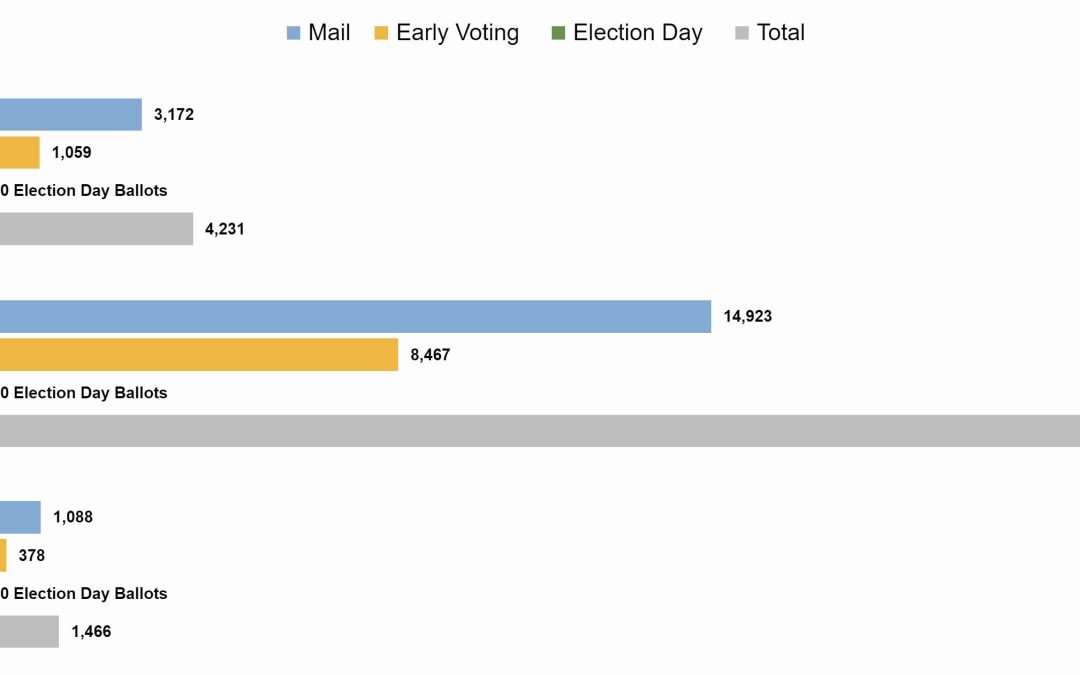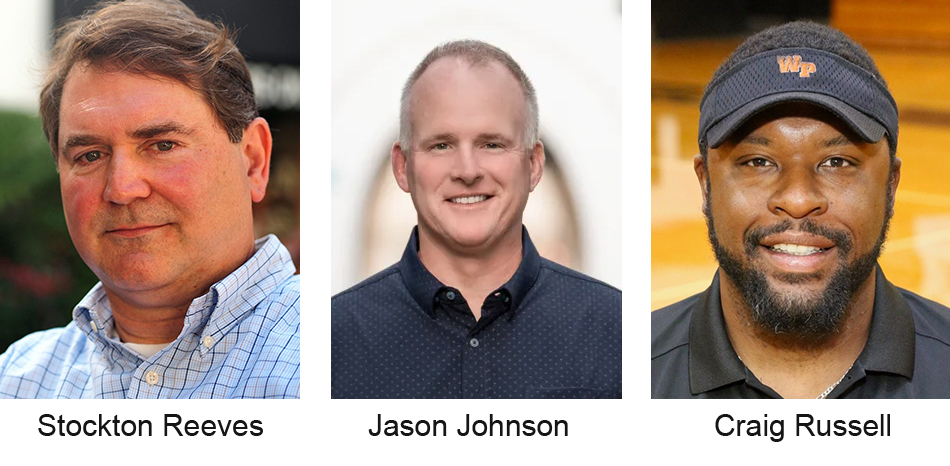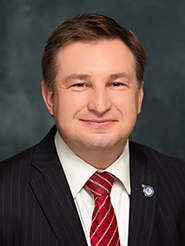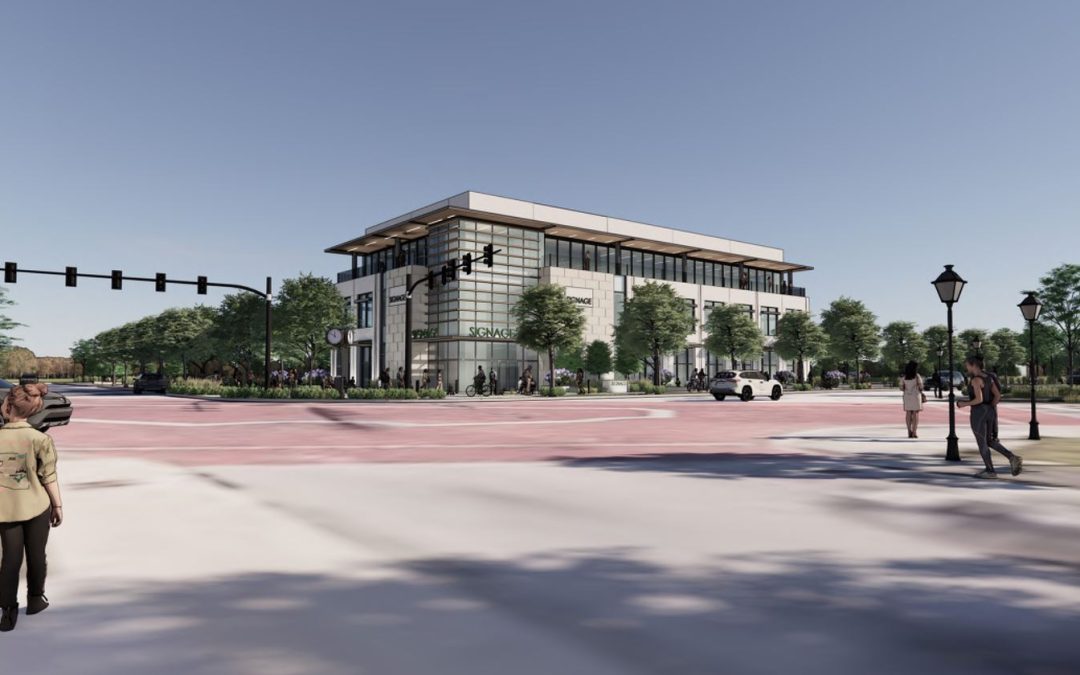
by Beth Kassab | Mar 13, 2024 | City Commission, Election, News, Uncategorized
Commission delays final approval on leaf blower referendum
Issue still not settled as two commissioners asked for more information
March 13, 2024
By Beth Kassab
Winter Park commissioners on Wednesday punted the final approval for a voter referendum on gas leaf blowers until April when a new mayor will likely preside over the hearing.
The decision came after two votes ended in a 2-2 tie, meaning no action could be taken on the matter. Commissioner Todd Weaver was traveling and absent from the meeting.
Commissioners Sheila DeCiccio, who is running for mayor, and Marty Sullivan said they wanted to delay the vote on the referendum, which would ask voters next year if they want a ban on gas powered leaf blowers to stay in place.
Both DeCiccio and Sullivan raised questions about whether Gov. Ron DeSantis could veto language in the recently passed state budget that was inserted by Sen. Jason Brodeur to stop cities from banning gas leaf blowers.
The governor has about two weeks to veto line items once he receives the state budget, which hasn’t yet happened.
There’s no indication a veto is under consideration.
Winter Park commissioners adopted the ban in 2022 as a way to address resident complaints about the loud noise caused by the devices and cut down on harmful emissions and air pollutants. But the board opted to delay enacting the change to give residents and landscape companies time to transition to battery-powered blowers.
In recent months, as the June enactment date was approaching, landscape companies rallied for a repeal of the ordinance, citing burdensome costs of the battery models and other concerns like whether those models would be powerful enough to do the job.
Brodeur heard those complaints and decided to intervene at the state level.
But DeCiccio and Sullivan also questioned whether Brodeur’s preemption applies to Winter Park.
Brodeur told the Voice the language does apply to the city and he purposefully did that as an extra measure to keep the city from enacting the ban until the summer of 2025 at the earliest.
But the way the preemption is worded appears to only prohibit cities and counties from adopting new ordinances or amending current ordinances before the summer of 2025. Winter Park’s city attorney agreed with that interpretation.
If the city’s referendum does not go forward then the ordinance is set to take effect this summer, though the commission delayed issuing any fines for violations until January.
Mayor Phil Anderson and Commissioner Kris Cruzada said they wanted to finalize the referendum and let the voters have a say on the matter. But they lost in a 2-2 tie.
The matter is now set to be debated again at the April 10 City Commission meeting.
Anderson is expected to preside over his final meeting on March 27 and hand over the gavel to a new mayor during the April 10 meeting. Depending on the outcome of next week’s election, a new commissioner for Seat 2 could also be sworn in during that meeting.
But the Seat 2 race is a three-way contest and it’s possible it will head into a run-off that won’t be decided until April 16. If that happens, then there will only be four commissioners to decide the issue on April 10.
WinterParkVoiceEditor@gmail.com
To comment or read comments from others, click here →

by Beth Kassab | Mar 13, 2024 | City Commission, Election, News
Republicans lead early voting in Winter Park and across Orange
How will the GOP’s presidential primary impact municipal elections?
March 13, 2024
By Beth Kassab
Republicans are turning out by a big margin in Orange County ahead of next week’s GOP presidential primary, which is also regular spring elections for Winter Park and other local cities such as Eatonville and Maitland.
Of all the county’s early voting sites, the Winter Park Library has seen the highest number of votes cast so far with 1,339, according to the Orange County Supervisor of Elections. Of those, nearly 60% or 774 are from registered Republicans. About 30%, or 395, are from Democrats. Another 160 votes are from people registered without a party affiliation.
Anyone can vote at the early voting sites, which means some of the votes cast at the library could have been from voters who live outside Winter Park. But it’s the best early indicator of how voting stands so far.
In Winter Park there are about 22,000 active registered voters. They are close to evenly split among Republicans and Democrats with Republicans leading slightly with 8,300 versus 7,700 Democrats.
Yet Republicans are driving early voting by nearly 2 to 1.
County wide, Republicans are driving early votes by an even wider margin with more than 23,000 ballots so far compared to 4,000 from Democrats.
Winter Park’s election for mayor and Seat 2 commissioner are technically non-partisan, but party politics often plays a role.
The Republican women’s club in Winter Park, for example, held an event for Seat 2 candidate Stockton Reeves, who has also run as a Republican (and lost) for a Florida House seat.
Past elections, though, have shown Winter Parkers to be discerning when it comes to local politics. Issues like development rules, brick streets, lake quality and parks rarely appear to fall along strict party lines.
In other words, it’s not clear that Donald Trump’s name on the ballot will drive turnout for a single candidate among Republican voters in the municipal races. Democrats decided last year to scrap their presidential primary in Florida in an effort to aid President Joe Biden.
Jason Johnson and Craig Russell, who are also running for Seat 2, appear to have refrained from party rhetoric in their campaigns.
The key differences between Johnson and Russell come in the form of their responses on development questions. For instance, Russell, who is backed by the Winter Park Chamber of Commerce has said he is open to revisiting the original Orange Avenue Overlay, which allows for taller buildings and more dense development, and is also open to lessening the requirements for developers to build parking spaces. Johnson has said he would not return to the old zoning rules and does not want to see major changes in the parking code.
Early precinct data from the nine precincts with Winter Park addresses shows 2,685 returned mail ballots and early votes so far, according to the supervisor’s office. A party breakdown for that data isn’t available.
The most votes so far are associated with the precinct at the Winter Park YMCA, which has 538 returned mail votes and 159 early votes. That’s followed by the Winter Park 9th Grade Center, which totals 255 returned mail votes and 107 early votes and Orange Technical College with 212 returned mail votes and 98 early votes.
Early voting runs through Sunday from 10 a.m. to 6 p.m. each day. Click here for locations.
Polls open on Election Day (March 19) at 7 a.m. and close at 7 p.m. Voters can find their precincts here.
WinterParkVoiceEditor@gmail.com
Donald Trump may be the clear Republican nominee for president, but the question
To comment or read comments from others, click here →

by Beth Kassab | Mar 11, 2024 | City Commission, Election, News, Uncategorized
Candidates' final push for votes underway
With just one week until Election Day, voters hear closing arguments from candidates
March 11, 2024
By Beth Kassab
With just seven days until election day, candidates are making a final push for votes this week and the latest financial reports reveal who leads in campaign spending and fundraising.
Jason Johnson and Craig Russell, both running for Seat 2 on the City Commission, released dueling closing argument emails over the weekend.
“The results of this race could come down to just a handful of votes,” read an email to voters from Russell’s campaign manager.
The coach and teacher at Winter Park High School is running “to promote transparency, accountability and representation for all our residents,” the email stated.
Russell is bringing the biggest money to the race with his campaign spending $42,000 so far — more than the other two candidates in his race as well the two candidates in the mayor’s race.
The difference is even more stark when coupled with the money raised by the Winter Park Chamber of Commerce’s political action committee known as Winter PAC, which raised $21,000 and spent more than $10,000 on Russell’s behalf, according to the reports filed with the city clerk. Russell is the only candidate endorsed by the chamber.
Contributions to the PAC include $7,500 from developer Allan Keen and his wife and one of his business entities, Development Opportunities Holding. Another $1,000 is from Automotive Services Network, a company controlled by the Holler family, which has also been a big contributor to Russell’s campaign account.
The Hollers, which own car dealerships as well as high-visibility Winter Park real estate along Fairbanks, Orange and Park avenues, contributed $8,000 to Russell from their associated businesses. Another $3,000 came from Holler family attorney Frank Hamner and his businesses.
Hamner told the Voice recently that the contributions from himself and the Holler family are unrelated to the family’s development interests in the city and that they know and support Russell as a community and nonprofit leader who serves underprivileged families.
The City Commission balked in January at a request from city staff to include some changes in the comprehensive plan that could potentially make it easier for the Hollers to develop a lot along the busy intersection of Fairbanks Avenue and Denning Drive, where the city is also trying to obtain more land for turn lanes to ease traffic congestion.
At a candidate forum last week at Westminster Winter Park, a senior living community, Russell appeared to indirectly address the money supporting his campaign.
“I’m nobody’s puppet as some of my opponents might believe,” he said, according to a video posted on YouTube of the event. “I speak for the residents and myself and that alone,” noting that he believed in mindful growth “not like Maitland,” in response to a question from the moderator about how Winter Park should balance neighborhood stability with business growth.
Russell also called out what he sees as “an elitist mindset” among current leaders that he says is “creating stagnation in this city that will inhibit its ability to grow.”
Johnson, who has raised $43,000 and spent $32,000, responded by saying the question sounded like “it was drafted by somebody at the Winter Park Chamber of Commerce, whose sole goal is to advance the interests of developers.”
“My job here is to preserve our residential communities,” he said. “We don’t need to pave over this city for commercial development.”
In Johnson’s email to voters over the weekend he attempted to further draw a distinction from his opponent, noting that he was not endorsed by the Chamber.
“I personally consider this a badge of honor,” he wrote. “I oppose the excessive high-rise and high-density developments that the Chamber supports. I support attractive and in-scale development that enhances the charm of Winter Park.”
Stockton Reeves, who has raised $69,000 and spent $42,000, emphasized his long family history in Winter Park and said he believes there is already enough affordable and workforce housing in the city. Most of his campaign funds have come in the form of a loan — worth $53,000 — from himself.
If one of the three candidates does not capture more than 50% of the vote on March 19, then the top two vote getters will head into a runoff to be decided on April 16.
In the mayor’s race, Sheila DeCiccio, the current vice mayor, has raised more than $40,000 and spent $30,000 so far. In recent days she has sent out an email thanking supporters and inviting them to an election night party.
DeCiccio also appeared at a forum at Westminster and, as has become a pattern in her race, she was the only candidate to show up.
Michael Cameron, her opponent, has not appeared at any of the public forums or at either private forum held for seniors at the Westminster and Mayflower communities.
He has raised $5,700 and spent nearly all of that on a political consulting firm.
WinterParkVoiceEditor@gmail.com
To comment or read comments from others, click here →

by Beth Kassab | Mar 9, 2024 | City Commission, News, Uncategorized
Jason Brodeur preempts cities on gas leaf blowers and wants study done
The state senator acted in the final days of the legislative session after the Winter Park City Commission caved to his request to put its ban on gas-powered blowers up to voters
March 8, 2024
By Beth Kassab
City Commissioners this week will be asked for final approval to place a question on next year’s ballot asking voters if they want to keep a ban on gas-powered leaf blowers — a policy intended to lower harmful emissions and the nearly universally detested noise from the devices.
Since the first of two needed approvals by the board two weeks ago, the political climate surrounding the debate has intensified with one state senator attempting to make the piece of lawn equipment the latest symbol of the anti-woke crowd.
When commissioners first voted 3-2 on Feb. 28 to put the policy on next year’s ballot (Todd Weaver and Marty Sullivan voted against it), they did so after City Manager Randy Knight told them Sen. Jason Brodeur agreed to stop his effort to preempt cities from banning gas blowers if the city put the question to voters.
But Brodeur moved forward anyway the very next morning.
He added language to the state budget to prohibit cities from amending or enacting such bans until July 2025 and added $100,000 to the state budget from the Air Pollution Control Trust Fund for the state Department of Environmental Protection to study the life cycle of gas-powered blowers versus battery-powered blowers.

Jason Brodeur
City officials have said the language doesn’t apply to Winter Park because its ordinance is already in place (it was passed in 2022, though it hasn’t yet been enacted because commissioners agreed to a delay to allow time for residents and landscape companies to transition to new blowers).
But Brodeur told the Voice in an email exchange that he did intend for his preemption to apply to Winter Park.
“Yes it applies,” Brodeur wrote. “Although they had a suspended ordinance it would require another vote to enact a ban, which will be preempted under the new law, should it be signed.”
He didn’t specify exactly what kind of vote he believed was required.
As it stands today, if the voter referendum does not go forward, the city’s ban is set to take effect in July — just five months from now — with fines delayed until January.
Brodeur said he felt forced to act immediately to prevent that from happening.
“I had hours (in the week before their meeting) to decide if I would ensure it would all be delayed. So I did,” he said in an email to the Voice. “I don’t have the luxury of monthly meetings and hours of discussion. If I didn’t act when I did, I wouldn’t have been able to and the net effect after their 42 months (30 prior months and the remaining 12 before the referendum) will be an extra 2-3 months of delay. Small price to pay for protection of consumers and businesses. Belts and suspenders. July 1, 2025 will be the next time they can enact anything if the voters choose to.”
Mayor Phil Anderson, when told of Brodeur’s interpretation of the state budget language, said he did not want to comment until he had the opportunity to more fully understand it.
Commissioner Todd Weaver said he doesn’t think the new state language impacts Winter Park or other Florida cities that have already enacted a ban on gas leaf blowers, but called the move by Brodeur “disingenuous.”
“For me, it’s a battle in a bigger war, and the war is pushing back against the Legislature from taking away our home rule,” he said. “I feel that Sen. Brodeur misled us because — it won’t affect us — but he’s trying to crowd out other cities that want to do it.”
Brodeur also heard some pushback on the Senate floor last week in the final hours of the state budget debate.
Sen. Jason Pizzo, a Democrat from Hollywood, asked if Brodeur wasn’t exploiting the budget process by pushing new policy — without any notice or debate — by tying a costly study to the idea.
“How is that not cheating by just throwing some appropriations on it?” Pizzo asked, later emphasizing, “Why do a preemption, which is policy, on a subject not discussed or passed in committee?”
Brodeur said the study was crucial to understand the environmental hazards of lithium ion batteries — the batteries often used in portable electronic devices — in landfills and specifically mentioned fires at landfills caused by batteries. He also said the “effect of not doing this is a tax increase,” because transitioning to electric leaf blowers will cause consumers and landscape companies to spend money.
The U.S. Environmental Protection Agency published in 2021 an analysis of lithium ion battery fires in waste management and recycling.
The report found 245 fires in 64 waste management facilities likely related to lithium metal or lithium ion batteries.
But that problem is from old batteries discarded from a wide range of products such as phones, laptops, wireless headphones, gaming devices and more. Lawn equipment wasn’t even mentioned in the study.
Questions surrounding the proper regulation of and consumer education about battery disposal from the products many people now find essential to daily life are already being asked and debated.
That problem would exist with or without electric leaf blowers.
And data from the EPA also shows that Florida leads the nation when it comes to pollutants in the form of fine particulates from gas lawn equipment like blowers and mowers. Those microscopic droplets are inhaled and can cause serious health problems, according to the agency.
That’s one of the reasons, in addition to the nuisance caused by the noise from blowers, that Winter Park commissioners said they acted in the first place now more than two years ago.
Brodeur required the state study to be done by January because he wants voters to have the information before the March 2025 referendum, if that goes forward.
“Instead of virtue signaling or political preferences dictating policies that should largely be left to a homeowners’ association, I would like to give consumers and business owners the scientific knowledge to know whether enacting a de facto tax increase on anyone who owns a gas powered leaf blower is worth the cost,” Brodeur said. “Because if we don’t have a safety or environmental reason for these ordinances, all liberty is at risk.”
WinterParkVoiceEditor@gmail.com
To comment or read comments from others, click here →

by Beth Kassab | Feb 28, 2024 | City Commission, News
Voters will decide gas leaf blower ban next year
The referendum comes in response to a threat of state preemption by Sen. Jason Brodeur
Feb. 28, 2024
By Beth Kassab
Voters will decide next year whether to keep or toss the city’s ban on gas powered leaf blowers in March 2025 .
Commissioners voted 3-2 to put the question on the ballot in response to Sen. Jason Brodeur’s threat to preempt such a ban in cities across Florida after residents complained that the ban was an example of local government overreach.
Mayor Phil Anderson, Vice Mayor Sheila DeCiccio and Commissioner Kris Cruzada voted in favor of putting the question on the ballot. Commissioners Todd Weaver and Marty Sullivan voted against it.
If voters decide to keep the ban, it will go into effect in the summer of 2025.
The ordinance was unanimously adopted by the commission in January of 2022, but wasn’t set to go into effect until June of this year.
Commissioners said the ordinance is necessary to protect residents from the ear-piercing noise and pollution that results from the gas blowers.
Weaver, who has led the call for the ban, noted that governments intervene when substances or devices are deemed harmful such as asbestos in buildings or the cocaine that was once in the old formula for Coca Cola.
Wednesday night’s action means it will remain on hold until after the vote a year from now.
WinterParkVoiceEditor@gmail.com
To comment or read comments from others, click here →

by Beth Kassab | Feb 28, 2024 | City Commission, News, Orange Avenue Overlay, Zoning and Development
After last minute change, commission unanimously approves McCraney building
The three-story development, which is the first approved in Orange Avenue Overlay, will provide offices and some other use such as a small restaurant or furniture store
Feb. 28, 2024
By Beth Kassab
The City Commission unanimously approved a three-story building of mostly offices on Wednesday at the six-way intersection of Orange and Minnesota avenues and Denning Drive.
Developer Steve McCraney’s project is the first to be approved under the Orange Avenue Overlay, which sets the tone and density for redevelopment along the corridor between Rollins College and U.S. 17-92.
The Commission appeared poised to deny the project with three commissioners — Vice Mayor Sheila DeCiccio and commissioners Todd Weaver and Marty Sullivan — saying they could not vote in favor of it because the building would only contain offices rather than mixed uses as the city code requires.
DeCiccio said she was concerned that allowing the departure from code would set a precedent for other developments that would undermine the vision for the area.
“If we capitulate to you on this issue the entire OAO is out,” she said. “We will be open to endless lawsuits for those who do not get their way.”
About three hours into the discussion, Mayor Phil Anderson called for a break. When the meeting resumed about 20 minutes later, McCraney attorney Becky Wilson offered that at least 25% of the building would include other uses such as a less than 12-seat restaurant, furniture store, personal service provider such as a fitness center or salon.
After that, all five commissioners approved the project.
A number of residents spoke passionately for and against the development.
Anderson said he considered it a “win-win” because McCraney could have built a much larger building on the property. He also noted the previous version of the Orange Avenue Overlay put in place by a different commission five years ago would have yielded a much different result.
“Five years ago, the prior commission had a very different vision,” he said. “The buildings would have been three to four times the size allowed now.”
WinterParkVoiceEditor@gmail.com
To comment or read comments from others, click here →








Recent Comments